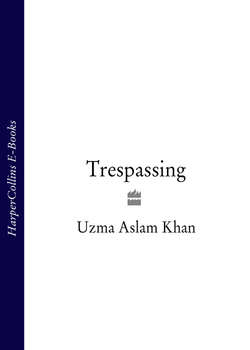Читать книгу Trespassing - Uzma Aslam Khan - Страница 26
3 Life at the Farm
ОглавлениеA quartet of armed guards paced the farm’s exterior. The boundary wall extended into five rungs of barbed wire. The iron gate was topped by a plethora of slender spikes pointing up at the grayish-yellow sky. Inside the gate sat two more guards, but unlike her private escorts and the sentinels outside, these two were draped in soussi lungis from the mill. The cloth was dyed indigo and mint and shimmered like cock feathers in the sun. Together, they formed a friendly duo: they were two of Inam Gul’s three sons.
Their bare arms and torsos glistened with sweat and the lungis wrapped them so tightly she could see the contours of their very different body types. On Shan, boyish and slight, the cloth rippled around the curves of a small tight bottom. But on Hamid, it hugged a pair of bulky thighs. She noted also his solid, wrestler-like gut. He would have been very handy with a pair of oars on a stormy night at sea.
The cook and his family had come into Dia’s household two years before her father left it. They’d moved to Thatta from their village, driven out by the trawlers that invaded the local fishermen’s zone. Mr Mansoor had seen Inam Gul’s family outside the tombs of Makli Hill, close to the farm, and offered them work here.
As Dia entered the grounds, the two sons lowered their Kalashnikovs to let her through. ‘How is everything?’ she piped, relieved to stretch her legs and be in congenial company again.
‘We’ll have to see,’ said Hamid. ‘Sumbul says there are fewer good cocoons than last year.’
‘And that was worse than the year before,’ Dia sighed.
The yield of leaves had peaked at sixty tons when she was a child. But in the last three years, due to the increasing water shortage, this had begun to drop startlingly. A reduced diet meant larvae either never reached the cocoon-stage, or that the cocoons were thin-shelled, too small, or pierced, resulting in poor quality threads.
The water channels tinkled melodically, reminding Dia, with each drop, how much depended on them. In the stifling, pre-monsoon heat of May she fanned her face with a corner of her dupatta and hoped the year would be a wet one.
Leaving the guards, she took her time strolling between the rows of mulberry trees, carefully planted eighteen feet apart. Ahead of her fluttered a pair of black swallowtail butterflies. They chased each other, landed on a twig, and mated, tail to tail, resembling a single creature with two heads and four wings. The male must have overpowered her with his scent, she mused. In moths, it was the female that produced the aphrodisiac. It could be so powerful that immediately upon her emergence from a cocoon, if a male hovered nearby, she’d lure him. She’d have sex at birth. Dia had tried many times to witness this, but in all her trips to the farm, never succeeded. This season, she was determined to.
She crossed over to the shed. From the outside, it resembled a greenhouse: low-lying and flat-roofed. Adjacent to it was a two-room shack. From here came Sumbul, Inam Gul’s tall, languid daughter and the farm’s most valued worker. A lilac kameez offset her smooth, nut-brown skin, and she looked like a jacaranda tree in bloom. Approaching Dia Sumbul swayed, carrying a baby on her hip and a clipboard in her right hand.
‘Salaam Baji,’ Sumbul greeted her.
‘Waalai-kum-asalaam.’
‘How is Aba?’
‘Oh fine,’ answered Dia. ‘Mischievous as ever. He sends his love. How’s your husband? Is everything okay at home?’
Sumbul smiled, tugging the braid that had slipped over her shoulder. It was so long and thick she’d twisted it in a U-turn. ‘His mother’s gone back to our village for a few weeks. Things are better. But,’ she looked away, ‘I think a fifth is on the way.’
Dia sucked in her breath; Sumbul was only her age. ‘And you still don’t want Ama to give you pills?’
‘What if he finds out?’
‘Keep them here, at the farm. He’ll never know.’
Sumbul sighed, adjusting the baby to her other side. ‘No, Baji.’
Dia shook her head but said nothing; the choice was Sumbul’s.
Together they entered the shed.
The interior was hot and humid, fanned with a continuous stream of fresh air. It was divided into four sections. The first, empty during this season, would soon hold the eggs laid by the current batch. In the second room was a long table with trays of wriggling larvae feeding on finely chopped mulberry leaves. Dia walked past the trays, greeting the women who tended the maggots. As in the days of the Chinese Empress, now too silkworms were bred by women. With the exception of the gardeners and the security guards, the farm was entirely run by them, which was why they were allowed to work at all.
When they first started, the sight of the larvae had made the workers squirm. Touching had been out of the question. But now the insects were handled as mechanically as braids and babies; sliding a handful down the shirt of any farm worker would never produce the effect it had on Nini. Despite herself, Dia smiled.
Sumbul, guessing the reason correctly, asked how the plan had worked.
‘Well, unfortunately Nini overreacted. She has marriage on the brain.’
‘Marriage?’ Sumbul adjusted the baby again. ‘Well it’s no surprise, is it? Nissrine is so beautiful!’
‘Is it her beauty that’s made her change? She doesn’t even know the boy she’s after.’
‘Most women don’t,’ replied Sumbul. ‘Inshallah, she can make it work.’
But why should she?
